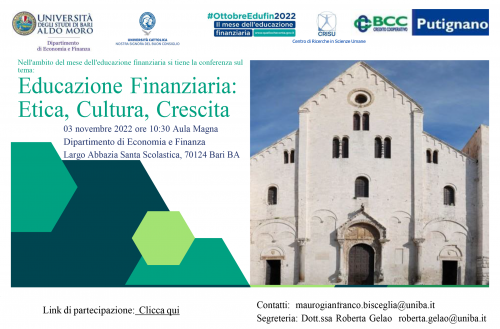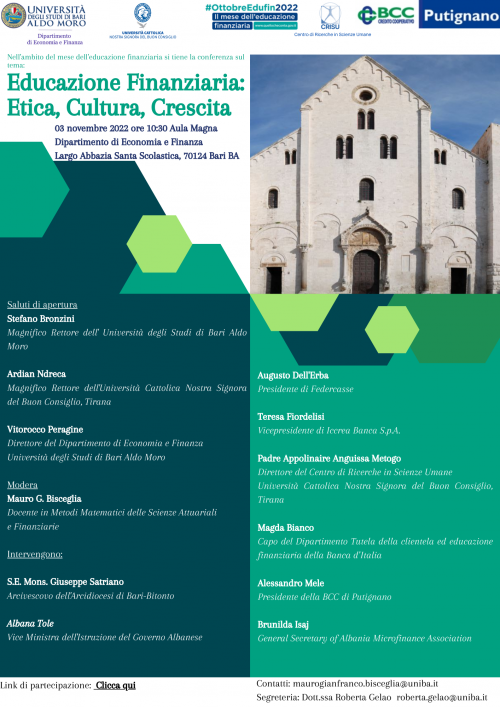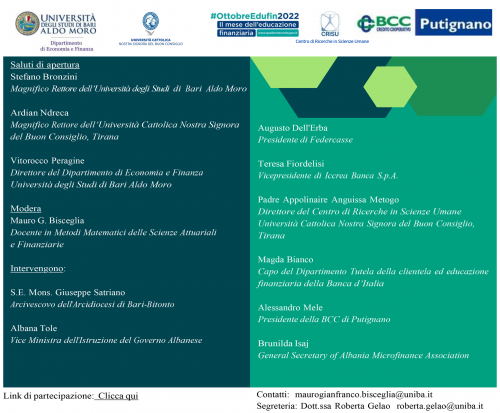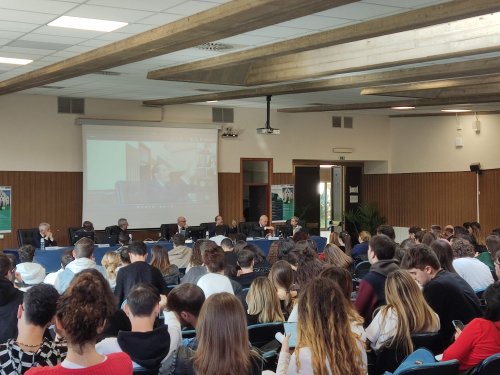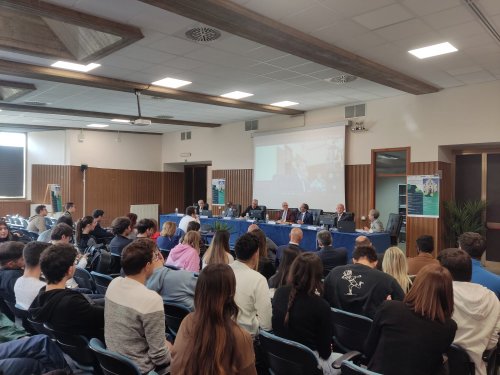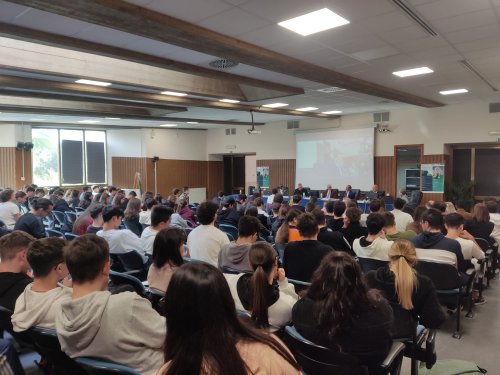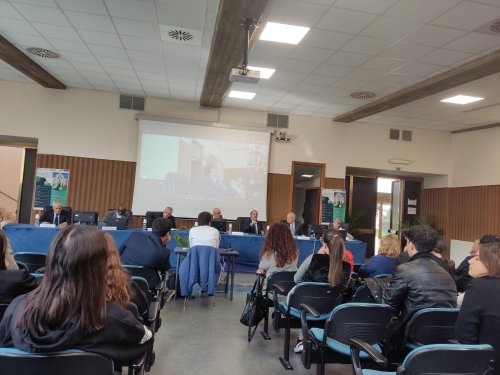As part of the activities of the Research Center in Human Sciences (CRISU), on 03 November 2022 at 10:30 am, at the Aula Magna of the Department of Economics and Finance of the University of Studies of Bari Aldo Moro, was held in presence and remotely, the following Conference:
* Financial Education: Ethics, Culture, Growth *
This event, included in the month of Financial Education, involved the University of Bari Aldo Moro and the Catholic University "Our Lady of Good Counsel" in Tirana, and brought together eminent personalities around a table from the world of finance and academia, in the presence of numerous students.
The topic of the day, as broad as it is relevant, gave free space to the various speakers to share their experience on the relationship between finance, education, ethics, culture, and growth. The common denominator, as emerged from the exchanges, is the territory. Finance is in fact an instrument at the service of the territory. Faced with the new developments that are changing the face of finance today, it is essential to reaffirm the relevance of social justice, environmental justice, and dialogue with ourselves. It is clear today that the relationship between law and economics requires profound reflection. The law establishes the good. As a laboratory for the discernment of economic models, the University has an important role. It is from the world of science (the University) that a new ethics of finance could be developed, fundamental as well as epistemic.
At the beginning of the sessions, the moderator Prof. Mauro Bisceglia gave the floor to the academic, political, and religious authorities for institutional greetings. Prof. Stefano Bronzini, Rector of the University of Bari Aldo Moro, Prof. Ardian Ndreca, Rector of the Catholic University "Our Lady of Good Counsel" of Tirana, HE Mons. Giuseppe Satriano, Archbishop of Bari and Mrs. Albana Tole, Deputy Minister of Education of the Albanian Government.
In this first phase of greetings, have emerged various aspects that deserve interesting insights. The two Rectors particularly highlighted the role of the University as a laboratory at the service of the discernment of economic models for the territory, just as the Archbishop emphasized the significant perception of what affects society in everyday life. The need to protect social justice and the relationship with the environment is perceived more clearly, to be understood in turn in terms of justice. Deputy Minister Albana Tole (who sent the text of her greeting) underlines how financial education should intervene "first of all to train financial actors who care about the good of the territory, but also to train the population to be aware of the advantages of finance.
The Cavaliere Augusto Dell'Erba, President of Federcasse, the Italian Federation of Cooperative Credit Banks Casse Rurali, is the representative association of over 430 banks, which protects and promotes the interests of Cooperative Credit Banks, Casse Rurali, Casse Raiffeisen Italiane and the companies of the system in his speech, wanted to propose to students and their professors a highly topical issue among the issues that today affect and influence trust, that is, the relationship between economics and law. The Knight has in fact underlined how those who "own" the law can also establish the good and its value, showing how the value of the good can vary and change according to the law.
The lawyer Teresa Fiordelisi, Vice President of Iccrea Banca SpA, the Central Institute of Cooperative Credit, parent company of the Iccrea Cooperative Banking Group, with over 130 banks throughout Italy. Among other things, she is also President of iDEE, the Association of Cooperative Credit Women. In her speech, she highlighted some aspects deriving from her experience as a woman in the world of Cooperative Credit and that of finance in general, underlining how many stereotypes related to gender diversity should not have a foundation in a community that enjoys a good financial culture. Unfortunately, from studies carried out, emerges that gender diversity causes behavior in financial choices, aversion, or propensity to risk, precisely in function of gender diversity. Different types of investments, that a family face following the birth of a child, whether this is male or female. A good school and consequently a healthy financial education are an excellent basis for posing balance between insignificant conjectures.
Mrs. Magda Bianco, Head of the Customer Protection and Financial Education Department, of the Bank of Italy and member of the Promoting Committee of Financial Education in Italy, in her presentation focused on the first articulation of the day's theme: financial education, its relevance, the situation and commitment to the present and the future. Her intervention highlighted the big uncertainty in the ordinary citizen in the face of financial issues. Uncertainty is accompanied by vulnerability also due to the increase in poverty and inequality. Now, the blame lies with war and inflation. Such a scenario commits the world of knowledge towards greater resilience and financial inclusion of citizens, aware of the choices of economic nature. The analysis, both nationally and internationally has highlighted some problems, in particular the gaps due to gender. In fact, it can be deduced, as an example, that due to cultural factors and certain attitudes (aversion to risk, competition and self-confidence), women have fewer financial skills. The intervention concluded with the presentation of the financial education programs of both 2017 and 2021, led by the Committee for the planning and coordination of financial education activities. Financial education is a response to a changing world.
Mrs. Brunilda Isaj, Secretary General of the Microfinance Association in Albania, intervening electronically from Albania, focused on the problem of financial literacy in Albania. On a grid that takes into consideration knowledge, behaviors, and attitudes towards the relevant topics of finance, the data shown showed that the financial literacy level of Albanians is low compared to the average of individuals in the world. People in Albania own only 53% (11.2 out of 21) of the total financial knowledge, behaviors, and attitudes, which is reflected in a low level of financial inclusion. Only 54% of Albanians know at least five financial products, compared to 83% of individuals globally. Furthermore, the use of payment products is nearly 2.5 times lower than the global level. The data shows a low financial well-being score of individuals in Albania, reflecting their insecurity about finances and planning for the future.
In his speech, Father Appolinaire, Director of the Research Center in Human Sciences (CRISU), emphasized the relationship between finance and ethics. After considering three approaches to this report over the past few decades, he pointed out that it has been a reactive perspective so far. The ethical question in finance has so far responded to problems that have already been verified, especially in the 2007-2008 crisis. He thinks that “the ethical question, even in the world of finance, needs to be put to the basis. Every reality, every human activity, to be clear, finds its ethical value in its very reason for existing. The question to ask is therefore: why does finance exist? What is it for? Asking the question, what is it for, does not simply mean bringing an instrumental value, an efficiency in use, but to go far beyond, in depth. What is the use of asking the question of the full realization of man? How does finance participate in welfare? Just to stay in modern terms, however imprecise!”. The answer is to consider finance as its foundation, with a fundamental ethics, and to consider the same financial instruments with an epistemic ethics. This requires a great deal of expertise in the field. The specialists of such an ethics must be at the base specialists in finance and at the same time specialists in the science of ethics with a fundamental ethics, and to take into consideration the financial instruments themselves with an epistemic ethics.
The works ended with the intervention of Adv. Alessandro Mele, President of the BCC of Putignano, who recalled for the occasion, the tenth anniversary of the BCC of Putignano, born from the dream of a group of willing men and urges young people to know, an index of awareness and freedom


